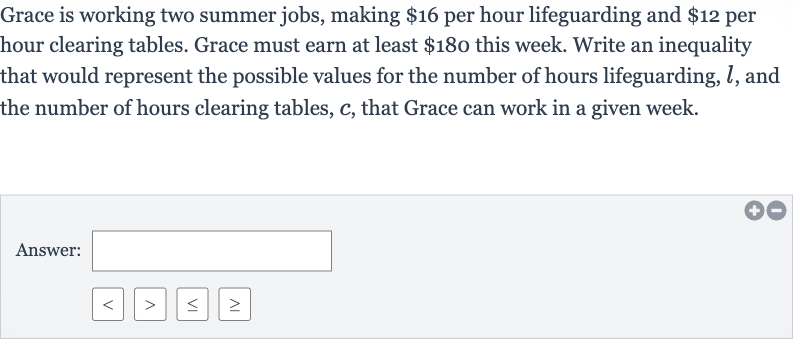AI tutor
Welcome to Bytelearn!
Let’s check out your problem:

Grace is working two summer jobs, making per hour lifeguarding and per hour clearing tables. Grace must earn at least this week. Write an inequality that would represent the possible values for the number of hours lifeguarding, , and the number of hours clearing tables, , that Grace can work in a given week.Answer:
Full solution
Q. Grace is working two summer jobs, making per hour lifeguarding and per hour clearing tables. Grace must earn at least this week. Write an inequality that would represent the possible values for the number of hours lifeguarding, , and the number of hours clearing tables, , that Grace can work in a given week.Answer:
- Define Variables: Let's define the variables:- number of hours lifeguarding- number of hours clearing tablesGrace earns \$\(16\) per hour lifeguarding and \$\(12\) per hour clearing tables. She needs to earn at least \$\(180\). We can write an inequality to represent this situation.
- Write Inequality: We can express the total earnings from both jobs as the sum of the earnings from each job. The inequality will represent the condition that the total earnings should be at least \(\$180\). So, the inequality is: \(16l + 12c \geq 180\)
- Express Total Earnings: Now, we have the inequality that represents the possible values for \(l\) and \(c\) that will allow Grace to earn at least \(\$180\). There is no need to solve for a specific variable since the question only asks for the inequality itself.
More problems from One-step inequalities: word problems
QuestionGet tutor help
QuestionGet tutor help
QuestionGet tutor help
QuestionGet tutor help
QuestionGet tutor help
QuestionGet tutor help
QuestionGet tutor help
QuestionGet tutor help
